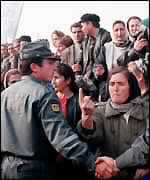DUISI, GEORGIA
Targeted for a possible U.S.-backed anti-terrorist operation, Georgia's remote Pankisi Gorge bordering Chechnya is a pocket of allegations and denials, of welcoming smiles and challenging stares.
Walking up a side street in a Pankisi village, two men in the garb associated with Chechen rebels stopped cold when they saw a Western stranger, then ducked their heads, pulled their coats around them and hurried away. ``Snipers,'' muttered a Georgian watching the encounter.
An annoyed Chechen disagreed. ``They think every man with a beard is a fighter. But Muslims always have beards,'' said Magomed Azayev.
Azayev is one of thousands of Chechens who moved to the gorge to escape the war across the rugged mountains in their separatist Russian republic. He dismissed claims that Pankisi is ridden with crime and danger and that guerrillas with links to al-Qaida are sheltering here.
``We've been here three years already; if there were criminals here, we wouldn't stay,'' he said.
But across the crumbled asphalt of Duisi's main street, an agitated woman claimed lawlessness is rampant.
``I was on a bus that came here and was shot up by robbers. Only with God's help are we alive. Nobody was interested in it,'' she said, declining to give her name out of fear. ``The police don't do anything.''
Standing next to her, Mukhmad Kavtarashvili agreed. ``We need to live in peace,'' he said.
Georgian authorities had long appeared reluctant to take action in the gorge, either against reports of rising crime or on Russian claims that Chechen rebels operate out of Pankisi.
But the prospects of a full-scale crackdown rose last month when Washington said it would send up to 200 soldiers to train Georgian troops in anti-terrorist operations, citing Pankisi as a prime concern.
Some people here call that a severe overreaction. They argue no one has provided definitive evidence that Chechen rebels and al-Qaida-affiliated fighters are in the gorge.
``It needs to be proved ... nobody can just name us as terrorists,'' said Khizri Aldamov, leader of the organization Chechen Disapora in Georgia.
Sardo Valishvili, who lives outside Duisi, a village at the north end of the gorge, sneers at that stance.
``What proof do you need? It's obvious,'' he said, citing his own observations of men like those seen in Duisi, whose untrimmed beards and long blouses contrast with the rest of the village's males, who wear shabby European-style clothes and who are clean-shaven or have trimmed beards.
The only undeniable information that Duisi provides is that fighting in the gorge would be extraordinarily difficult. Pankisi's few roads are so rough that even jeep-type vehicles are forced to move at a crawl. The steep, wooded slopes flanking Duisi provide hiding places for snipers and mortars and good escape routes for guerrillas.
In similar territory in Afghanistan, the U.S.-led anti-terrorist campaign has relied on heavy air assaults to support ground troops. But the United States has said its forces won't participate in any combat operation in Pankisi, and the small, under-financed Georgian military may not have the capacity to conduct a major assault.
Some of Duisi's people brush off worries about fighting altogether.
``Let them come. They can do whatever they want. They can't touch us - we're refugees,'' said Sultanbek Dzhabrailov.
Others see the future as a choice between the lesser of evils and say any operation would be better than involving troops from Russia, which has floated the idea of a joint operation with the Georgian army.
``If the Americans come, there won't be a war. If Russians come, war is guaranteed,'' Iza Imadishvili said as she considered the sparse selection of vegetables and bread at Duisi's small bazaar.
Even Aldamov, the Chechen refugee leader, sees a potential benefit in American troops coming. Noting that Russian planes reportedly have crossed into Georgian airspace to chase rebels, he suggested U.S. forces could bring technology to better monitor the frontier.
``The air border is uncontrolled. All the Chechen refugees are afraid of Russian bombs,'' he said.
- Author:
AP - Section:
WORLD HEADLINES


 Home
Home Discover Islam
Discover Islam Quran Recitations
Quran Recitations Lectures
Lectures
 Fatwa
Fatwa Articles
Articles Fiqh
Fiqh E-Books
E-Books Boys & Girls
Boys & Girls  Articles
Articles










